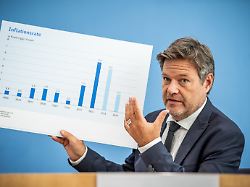Habeck lowers expectations
The way out of the economic crisis is longer than expected
October 11, 2023, 4:58 p.m
Listen to article
This audio version was artificially generated. More info | Send feedback
The German economy is recovering only slowly from the crisis. Economics Minister Habeck lowers the forecasts for this and next year. Nevertheless, you leave the valley and head uphill. Inflation will also decrease noticeably.
Germany needs more time to recover from the energy crisis resulting from the Russian attack on Ukraine. “We are therefore coming out of the crisis more slowly than expected,” said Economics Minister Robert Habeck in Berlin when presenting the autumn projections, where he referred to international conflicts and the ECB’s interest rate increases to combat high inflation. But the low point has now been reached. “We are leaving the valley, things are looking up again,” said the Green politician.
As a result, the federal government lowered its economic forecast and now expects gross domestic product to shrink this year. This means that Germany will be the only large industrial nation that will not grow in 2023. Specifically, the government now expects economic output to shrink by 0.4 percent in the current year. In the spring an increase of 0.4 percent was estimated. In 2024 and 2025 there should be growth rates of 1.3 and 1.5 percent again. For comparison: in 2022 it was still 1.8 percent, although with the last catch-up effects after the Corona crisis.
The government expects inflation to ease noticeably. After an inflation rate of 6.1 percent this year, values of 2.6 and 2.0 percent are forecast for 2024 and 2025. The European Central Bank (ECB) is aiming for two percent as the ideal level for the euro zone. “Inflation is going down,” said Habeck. “We also expect the domestic economy to pick up accordingly.” The wage increases would now reach the citizens. In addition, there is a robust labor market. However, the general increase in employment since the beginning of the year has been driven by foreign nationals. This trend is likely to increase in the coming years.
Foreign trade is also expected to improve despite a difficult environment. However, Germany’s most important trading partner China is likely to grow weaker next year than in 2023, said Habeck. Therefore, the structural problems at home would have to be addressed. Bureaucracy must be reduced, more skilled workers must be attracted from abroad and obstacles to investment must be removed.
Basis for tax estimation
The federal government is somewhat more optimistic with its economic expectations than the leading economic research institutes. They expect a decline in GDP of 0.6 percent in the current year and an increase of 1.3 percent in the coming year and 1.5 percent in 2025. The International Monetary Fund (IMF) also takes a more pessimistic view of the German economic prospects and says one German GDP is expected to shrink by 0.5 percent this year and grow by 0.9 percent in 2024.
The federal government’s economic forecasts will be used for the tax estimate for October 24th to 26th, which in turn will form the basis for the 2024 federal budget and medium-term financial planning. A worse economy means less tax revenue than previously planned and therefore less financial leeway for the traffic light government’s projects.
The opposition accused Habeck of glossing over the country’s economic situation. “Germany’s current economic crisis is self-made,” said Hansjörg Durz, chairman of the Union faction in the Bundestag’s economic committee. “So far, the traffic light economic policy has led to one thing above all: a red lantern in economic growth.”
DIW calls for higher investments
In contrast, the President of the German Institute for Economic Research (DIW), Marcel Fratzscher, said that the mood in the country was significantly worse than the economic situation. “Germany is not the sick man of Europe,” said the economist. The government should urgently change course in financial policy to stimulate more investment in infrastructure, education and research. It should also reduce regulation and bureaucracy.
The mood in the economy is anything but good, emphasized the German Chamber of Commerce and Industry (DIHK). “There is still no signal to move forward,” said its general manager Martin Wansleben. “High energy prices, uncertainty about future energy supplies, high taxes and fees, bureaucracy, a shortage of skilled workers and a sluggish global economy are putting a strain on business.” The war in Ukraine and the newly flared conflict in the Middle East are additional burdens.
According to Vice Chancellor Habeck, the economic consequences of the renewed Middle East conflict on Germany cannot yet be estimated. It is still too early to speculate about it. A lot depends on how the conflict develops. At the moment he is not expecting any impact on inflation, for example from the recent slight increase in oil prices. But that could change.
